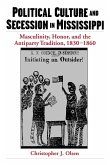The book focuses on four key themes that are central to the ethics of secession. The first examines normative issues, in particular the tension between 'choice' theories and those based on remedial 'just cause' arguments. The second discusses the problem of violence in secessionist struggles and the ensuing relationship between just war theory and the ethics of secession. The third problem is the relationship between nationhood and citizenship, and in particular the problem of applying what has now become a conventional distinction between ethnic and civic representations of the political community. Finally, the contentious issue of sovereignty and the way that it frames debates about self-determination. With each of these themes, the application of general moral principles to particular historical contexts opens up new avenues of research. This book is essential reading for those who wish to understand both the theoretical and practical issues concerning secession struggles in the world today.
Bringing together a range of specialists in their respective fields, the book provides a combination of original research with fundamental questions about why states stay together, and above all why sometimes they fall apart. When and under what conditions is the separation of one part of a state from another justified? Written in an accessible and informed manner, the authors seek to answer this question on the basis of ten case studies and a general review of the literature and theories of the question.
Hinweis: Dieser Artikel kann nur an eine deutsche Lieferadresse ausgeliefert werden.
Bringing together a range of specialists in their respective fields, the book provides a combination of original research with fundamental questions about why states stay together, and above all why sometimes they fall apart. When and under what conditions is the separation of one part of a state from another justified? Written in an accessible and informed manner, the authors seek to answer this question on the basis of ten case studies and a general review of the literature and theories of the question.
Hinweis: Dieser Artikel kann nur an eine deutsche Lieferadresse ausgeliefert werden.








